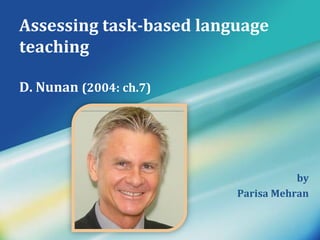
Assessing Task-based Language Teaching
- 1. LOGO Assessing task-based language teaching D. Nunan (2004: ch.7) by Parisa Mehran
- 2. Introduction and overview Assessment in TBLT: 1. Assessment should reflect what has been taught 2. Direct form of assessment Assessment in traditional, language-based curricula: 1. A representative sampling of the grammar, vocabulary and phonological features of the language 2. Indirect form of assessment TBLT presents challenges in all areas of the curriculum particularly in the area of assessment
- 3. Key concepts in assessment Evaluation vs. assessment Evaluation: 1. A broad, general set of procedures involving collection and interpretation of information for curricular decision making 2. This information generally includes data on what learners can and cannot do in the language 3. Evaluation can take place at any time 4. Any aspect of curriculum can be evaluated Assessment: 1. Procedures for collecting the learner data 2. A subset of evaluation Testing: 1. One form of assessment 2. More formal collection of data on learner performance Assessment measures need to satisfy three types of validity: 1. Content validity 2. Criterion-related validity 3. Construct validity
- 4. Indirect vs. direct assessment Direct assessment: learners are required to reproduce the kinds of communicative behaviors they will need to carry out in the real world Indirect assessment: the test does not resemble outside-class performance
- 5. System-referenced vs. performance-referenced tasks A system-referenced test item: requires the learner to demonstrate knowledge of the phonological, lexical or grammatical systems of the language A performance-referenced test item: requires the learner to demonstrate an ability to use the language Why to use indirect assessment? 1. Performance-based assessment can be difficult to set up and control 2. Grading learner performance can be highly problematic 3. They can be quickly and conveniently administered to many learners at the same time 4. They are easy to score Why to use direct performance-based assessment? 1. It measures Ss’ abilities to respond to real-life language tasks 2. Their scores can be used to predict Ss’ abilities in future real-world situations
- 6. Assessing proficiency vs. achievement Assessment of proficiency: proficiency is meant to be independent of any particular course of study and of a given syllabus Assessment of achievement: achievement refers to the mastery by the learner of specific curricular objectives According to Ingram (1984), general proficiency refers to the ability to use the language in everyday, non-specific situations
- 7. Teaching vs. testing Almost any teaching task can be used for assessment purposes and vice versa The difference is: 1. How the task fits into an instructional cycle 2. What is done with the learner output from the task
- 8. Task-based assessment Task-based tests require candidates to perform an activity which simulates a performance they will have to engage in outside the test situation Task-based testing is part of performance assessment Three essential characteristics of performance assessment: 1. It must be based on tasks 2. Tasks should be as authentic as possible 3. Success or failure in the outcome of the task must usually be rated by qualified judges Four factors that should be considered in grading tasks: 1. Code 2. Cognitive complexity 3. Communicative demand 4. Overlapping variables
- 9. Norm-referenced vs. criterion-referenced assessment Both have to do with how student test scores are interpreted Norm-referenced testing: 1. Ss are compared to each other 2. Ss’ scores are dispersed along a normal distribution 3. It is appropriate for ‘assessing abstracted language ability traits’ Criterion-referenced testing: 1. It compares Ss not against each other but on how well they do on a given assessment task 2. It is more appropriate than norm-referenced testing in TBLT 3. They are designed to assess Ss’ mastery of course objectives
- 10. The purposes of assessment Reasons for carrying out assessment in the first place should have an important bearing on: 1. How the assessment is carried out 2. When it is carried out 3. By whom 4. How the results will be reported There are different functions of assessment such as placement of learners in classes as the most important function
- 11. Self-assessment 1 To encourage learner autonomy and a focus on learning processes as well as learning outcomes 2 To involve learners in their own learning processes 3 To develop an understanding of learners’ own level of skill, knowledge or personal readiness for a task in relation to their goals Criticism to self-assessment: not all learners are accurate judges of their own ability
- 12. Techniques for collecting assessment data There is no limit to techniques and procedures for collecting data in task-based language classrooms Performance scales Production tasks: role play, discussion tasks and simulation Observation schedules Journals, diaries and learning logs Portfolios
- 13. Criteria for assessing learner performance 1. Accuracy, fluency and complexity Systematically manipulating the characteristics of tasks resulted in different levels of accuracy, complexity and fluency Five task characteristics: 1.Familiarity of the information in the task 2.Dialogic versus monologic task 3.Degree of structure to the task 4.Complexity of the task outcome 5.Transformation of language and content as speakers speak 2. Objectives-based criteria: the criteria are taken directly from the course objectives
- 14. Conclusion Assessment of learning outcomes should always: Be formative in nature Involve the direct assessment of student performance Be criterion- referenced Focus on the attainment of specific objectives rather than trying to assess general proficiency